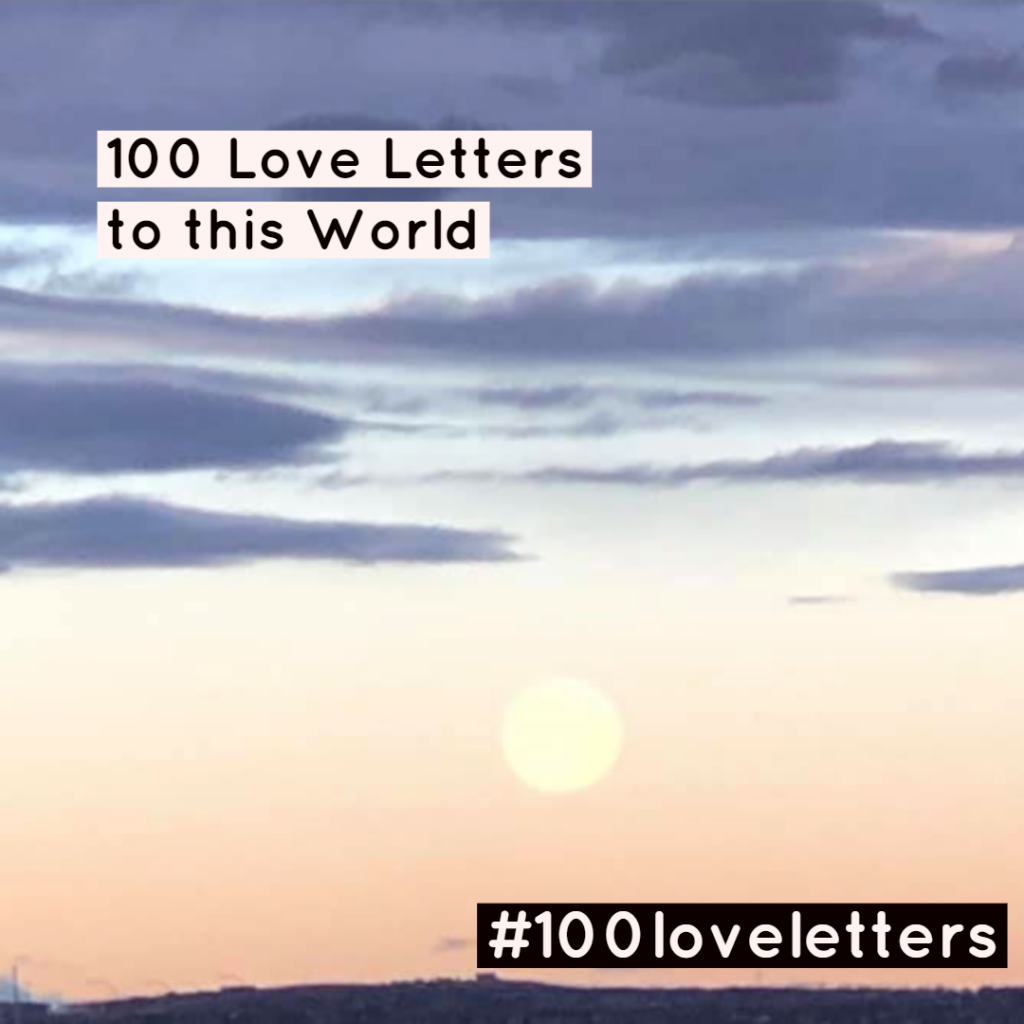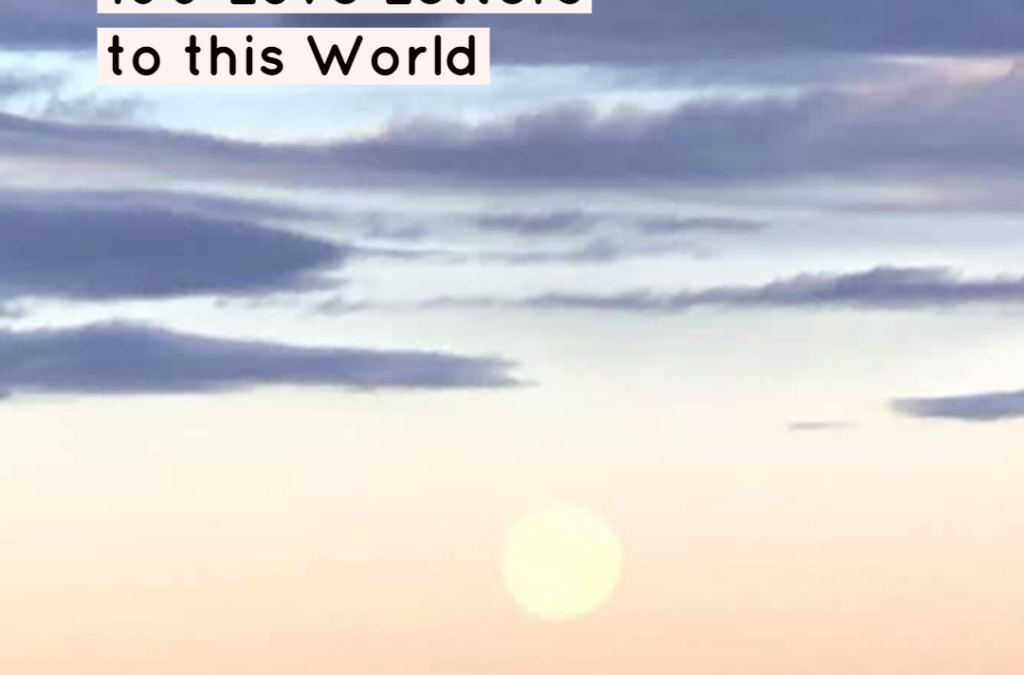
An Invitation
Do not think that one has to be sad in order to be militant, even though the thing one is fighting is abominable.
Michel Foucault
This is an invitation to join me in writing 100 love letters to this world. An invitation to spend 100 intentional moments loving this world, and documenting this love. Finding 100 things to love in this world, or loving one thing in this world 100 times. Being present in this world, and seeing its complexities, holding space for what is terrible and for what is beautiful.
You can find the email list here.
This world, which I propose we love with intention and with tangible actions, is full of grief and suffering and injustice, and many of us are resisting, responding. That core of recognizing and responding to injustice is central to this project.
Why speak of thriving and love when there are so many massive, urgent problems that need to be confronted? To write about the potential or trust and care, at this time in history, could seem like grasping optimistically at straws as the world burns. But durable bonds and new complicities are not a reprieve or an escape; they are the very means of undoing Empire.
Nick Montgomery and carla bergman, Joyful Militancy
Loving this world in a time of compounding crisis and active, necessary response can be challenging and it can feel counter-intuitive. But as I move through this difficult time in my own life, and as I witness community members similarly moving through fear, and grief, and anger, and despair… I find love and connection more and more critical.
Community care, connection, and the ability to recognize and express love; these are not just a reprieve or an escape, as Montgomery and bergman point out. They are the means by which we can respond to injustice.
And so, 100 love letters to this world.
To this world. And to those of us who are in this world, fighting for this world, fighting for each other within this world.
To all survivors today: your time is precious, your energy is precious, you are precious. Your love is precious, your relationships are precious. And I don’t mean precious like cute. I mean precious like invaluable like massive like power like transcendent.
Hannah Harris-Sutro
The goal of this project is not to stifle resistance or to turn our focus away from injustice. But rather to find a way to be in relationship with this world – this world that we have, the physical world, the social world, the emotional world that we find ourselves in right now, unique to each of us – that allows for love and struggle. I am not looking for a quick fix or a cure for the problems that we are facing; the idea of a “cure” for trauma is fundamentally ableist, and I reject it.
The idea that survivorhood is a thing to “fix” or “cure,” to get over, and that the cure is not only possible and easy but the only desirable option, is as common as breath. It’s a concept that has deep roots in ableist ideas that when there’s something wrong, there’s either cured or broken and nothing in between, and certainly nothing valuable in inhabiting a bodymind that’s disabled in any way.”
Leah Lakshmi Piepza-Samarasinha, Care Work: Dreaming Disability Justice
We are facing climate crisis, and seeing the effects more and more clearly. Time is short. We are at, and passed, many critical tipping points.
We are also facing an emboldened and increasingly powerful right wing, fueled by capitalism, climate denial, white supremacy, and cis hetero patriarchy.
Within my own heart, and within my communities, there is despair, hopelessness, existential dread. How do we move forward? How do we continue breathing, living, loving, in this context? How do we stay connected when we are in such pain, and when we are anticipating so much more pain?
It is easier to scroll the newsfeed endlessly, to think about collapsing insect populations and melting glaciers and rolled back rights and ongoing colonial violence, to think about these things rather than engaging with them. To grieve in an abstract and disconnected way. It is harder, and I am less likely, to go outside, to attend a rally, to have coffee with a friend, to breathe the air that I still can breathe, to see the moon in the sky, to feel the ground under my feet, to hear water moving through rivers and streams and in raindrops.
Moving from the abstract to the material is difficult, because it means facing what is at stake. Feeling my own body on the line with this world.
Underpinning so much of the despair is the sense of impending and worsening scarcity. Many of us have been so deeply steeped in capitalism and capitalism’s story about humans as inherently greedy, as hoarders and accumulators, that it is hard for some of us, for me, to think about scarcity without wanting to retreat. To turn inward, to accept the neoliberal premise of individualization, to become ever more an island.
Disconnection is a coping strategy. There is value in disconnection, in avoidance, in the inward turn. There are times when it is just what we need in order to continue on. But for myself, and for some of my community members, there is a way in which disconnection has stopped being supportive of my life and has become too heavy. I want to change it.
When I notice how much easier it is to access feelings and stories that close off acts of living and resistance, that’s when I know I need to interrupt the disconnection and find a way back. That’s where I’m at now. And that’s why this project exists.
Whatever comes next will be hard, and it will leave most of us hurting. We can learn from disability justice work, from racial justice work, from queer and trans justice work, from all the community workers who have come before us into apocalyptic trauma and have found a way to stay connected. We can take their wisdom and ask: How will we love this world? How will we love ourselves in this world? How will we love each other in this world?
Those are the questions I hope to ask with this project. And I hope that by bringing our love to this world, we can start co-creating possible futures together, or even just co-creating the possibility of imagining a possible future.
Your love letters can be as elaborate or as simple as you’d like. A single word or a ten-page billet-doux. A photograph, a drawing, a poem, a deep inhale. A conversation with a friend about what there is to love in this world, a moment in the mirror, a short story, a long story, a postcard. Love letters can take so many forms, and all of them are welcome.
All that is required is that you do this intentionally, that you find some way to connect with love for this world.
And your love, just like your love letters, can take many forms. Love can coexist with despair. Love can fuel anger. Love and grief know each other well. This project is not a demand for “positivity.” It is, instead, an invitation to connection.
This project will run from the New Moon on June 3 2019, to the Full Moon on September 14 2019.
Following the project, I will be collecting the love letters into a zine.
You can participate on social media by tagging your posts #100loveletters. If you’d like to receive my love letters in your email, you can sign up for the 100 Love Letters to This World email list. I’ll be sending out my own love letters throughout the project, and also sending out any letters that you submit to be included. You can submit those letters by emailing them to me at sostarselfcare@gmail.com.
If you want to be further involved, you can also support my Patreon, or find me on Facebook or Instagram.
This project is my fourth iteration of the 100 Love Letters process. (This process began with Stasha Huntingford years ago – I cannot take credit for it!)
The first 100 Love Letters project was 100 love letters written to ourselves. You can read about the origin of that project in this interview with Stasha Huntingford, the inspiration for the project.
The second 100 Love Letters project was one that I undertook personally. 100 love letters to my body, as a response to increasing chronic pain and other issues. This project is ongoing.
The third 100 Love Letters project was the Tender Year, and you can read about that project, a year-long collaborative project between Stasha, Nathan Fawaz, and myself, here.
When I let myself daydream about possible futures, I think it would be cool to pull all of these iterations into a book.
For now, though, join me in this project.

